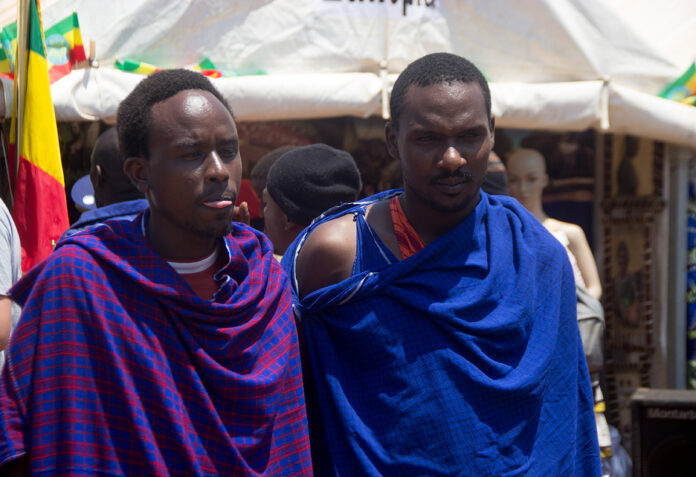
By Dianah Chiyangwa
Johannesburg, South Africa: Refugees and asylum seekers living in South Africa, are struggling to use the new Department of Home Affairs’s online permit renewal system, and this leaves many undocumented refugees and asylum seekers with numerous challenges that emanate from access to basic services such as taking children to schools, access to health services, and opening bank accounts.
When the contagious disease, COVID-19 erupted in 2020, South Africa’s Department of Home Affairs shut down its doors to refugees following declaration of the national state of disaster. In response to covid19 and lockdown regulations, the Department of Home Affairs, introduced an online extension system for asylum seekers and refugees’ status permit holders.
The call was made for asylum seekers and refugees whose permits and visa expired since the state of disaster was declared in March 2020 and the blanket expiry for qualifying refugees and asylum seekers was 30 April 2022. For asylum seekers and refugees whose permits and visas expired in March 2020, the Department advised refugees to renew their documents online which became a stumbling block for many refugees.
The community of the refugees and asylum seekers are accusing the department of not responding to their online submissions, in the process highlighting exorbitant prices charged by internet cafe owners to those desperate, vulnerable, and lacking IT skills.
Laura Padoan, spokesperson for UNHCR, at the United Nations(UN) Refugee Agency says, they are aware of the current challenges that refugees and asylum seekers face at the Refugee Reception Office.
“For asylum seekers with limited IT skills, navigating the online system can be especially difficult and this has been compounded by technical challenges with the system and the closure of the Refugee Reception Office during Covid lockdowns,” Padoan says.

and immigration services at foreign missions; and determines the status of asylum seekers and refugees in
accordance with international obligations.
On a cloudy morning, clad in her black hijab, Christina Mbawo, from Democratic Republic of Congo (DRC) is seen walking outside Desmond Tutu Refugee Reception Office seeking help from the security guards manning the gates of the centre. Mbawo, from Kibumba, fled to Johannesburg, South Africa in 2011, to seek refuge due to the ongoing conflicts in DRC.
Since the implementation of the online renewal system on 15 April 2021, refugees and asylum seekers like Mbawo, are struggling to use the online portal system, citing computer literacy and language barriers as French is their main language. Refugees and asylum seekers from Central Africa, mainly Democratic Republic of Congo (DRC) grapple with English and often make use of interpreters when seeking essential services.
Over the period of 10 years, Mbawo’s visit to Marabastad as it is commonly known by refugees and asylum seekers was not an issue as interpreters were always provided by the department. Her worst nightmare was in 2021, when she was informed by a church member that she needed to renew her asylum seekers permit online as it had expired.
“I am 55-years-old and I have never had an email address or the thought of having one in my life. I was told that I have to renew my permit using an email address, although I have a smart phone I don’t know how to create an email address and upload my document.”, said Mbawo.
According to McKinsey Global Institution research on Digital Identification: A key to inclusive growth published in 2019, indicates that digital identity is key to inclusive growth and can be confirmed through a digital channel, unlocking access to banking, governments banking, education and many other critical services. However, it is a disadvantage for many people like Mbawo, who have limited computer skills and find themselves seeking services at the internet cafes.
Sibongile Ndlovu, from Binga, Zimbabwe has been using asylum seekers permits since 2005. She says after being made aware of the online renewal system, she also had no email address and was advised to seek services at an internet café in Joubert Park where she was charged ZAR 150 (US$ 8) to create an email address. Ndlovu says she was assisted to create an email and sent her permit, but never received any response from Home Affairs.

Jeff Ekechi (not his real name) works as an assistant at an internet café near the Bridge Mall in Joubert Park. In 2021, Ekechi assisted Ndlovu to renew her asylum seekers permit but did not explain to her that she would need to return to the café to check for a response from the DHA.
“Since the online system was put into place, we have assisted a lot of people who did not have email addresses at a charge of ZAR 150 (US$ 8) per person,” says Ekechi.
Ekechi explains that the internet café set up a single email account for everyone who renewed their asylum documents. When asked how his clients would learn whether Home Affairs had responded, Ekechi says “when I check our computer and find responses from DHA, I trace the client’s telephone number on the form provided by DHA, and if the client doesn’t come to check we delete the emails because of many responses, and sometimes our system crashes or is affected by viruses.”
Unfortunately, for refugees and asylum seekers, like Mbawo and Ndlovu, who have limited access to the internet, limited participation in or access to digital ecosystems via systems smartphones and internet cafes poses security risks. Beyond security concerns, many active users are unable to keep track of their digital footprints and find it inconvenient and time consuming to register, authenticate and manage their online accounts.
Tewodros Alli, from Ethiopia, said that although he has limited computer skills, there is a large community of Ethiopians in Johannesburg and he was able to be assisted by his fellow countryman.
As instructed by DHA, when refugees and asylum seekers are requesting or submitting for e-visa renewal, they send email to Refugee Reception Officer (RRO) and an automated response from DHA’s central email address National Immigration Information System (NIIS) is received with an attached template to fill in, which then asylum seekers are required to send back with a proof of address and the expired permit. Refugees and asylum seekers claim that the NIIS process is not user friendly.
On the other side, at Little Mogadishu, as it is commonly known in Mayfair Johannesburg, Bilan Sharif from Somalia, runs a food outlet, said that internet cafes around Mayfair has helped many refugees and asylum seekers from his country to renew their papers at reasonable fee of ZAR100 ($5)

Pretoria.
In response to UNHCR in terms of helping the process of backlog at Desmond Tutu Refugee Reception Office, and the technical challenges that results in refugees and asylum seekers being turned away on a weekly basis and the measures that can be put in place in order to improve the services at the centre, Padoan explained that UNHCR raised these issues with the DHA in 2021, which is in the process of developing a new website to improve the online application and renewal process.
“UNHCR is working with DHA to improve sharing of data and statistics and on a project to resolve the asylum appeals backlog. We continue to closely monitor the asylum process and to advise the government on best practices to ensure that those in need of international protection receive decisions in a way that is fair and effective,” adds Padoan
Many people like Mbawo and Ndlovu, fear deportation as they are still walking around with expired papers. According to DHA, more than 155, 000 refugees and asylum seekers renewed their documents through the online system between its launch in April and December 2021. Authorities estimate that nearly 71, 000 permits were uncounted for as many refugees and asylum seekers may have left the country, died or may not be able to use the new system.
“There have been significant delays for new appointments for registration of an asylum claim, as well as issues with renewing permits online. There have also been reports of corruption which are very concerning. We urge authorities to crack down on any suspected cases of fraud in the system to ensure that services are provided freely and fairly,” explained Padoan.
A closer look at constitutional protections, refugees and asylum seekers are still grappling with many challenges and experiencing human rights violations, victimization, ill treatment and humiliation, hate crimes, and extortion from law enforcement officers.
Adding to the challenges of online renewal, the issue of the backlog is another concern faced by many asylum seekers in South Africa. At the end of 2019, the Auditor General Report found that the Refugee Appeals Board backlog was 147,794 and that it would take 68 years to attend to this backlog and UNHCR is assisting the DHA with the backlog.
This is evident as stated by Kopanang Against Xenophobia, an organisation dedicated to fight xenophobia in South Africa said in a statement on 26 June 2023, that, the crisis at Desmond Tutu Refugee Reception Office, resulting in a backlog of immigration applications and administrative inefficiencies, has had significant implications for migrants in South Africa. They raised their concerns after the utterances made by Fikile Mbalula, the African National Congress (ANC) General Secretary that undocumented migrants have been a ticking time bomb for the country.
“Nobody wants to be undocumented, but those fleeing persecution and wars often have no choice. Instead of scapegoating migrants and blaming the most vulnerable as the cause of social ills of society, the State should be promoting administrative justice and ensuring that public servants adhere to the Batho Phele principles” Kopanang Against Xenophobia said in a media statement.
Kudakwashe Vanyoro, Anthropology Lecturer at University of the Witwatersrand, highlighted in the Refugee Survey Quarterly 2023 that various studies over the last two decades unpacked the rationale of systemic failings in both South Africa’s immigration and refugee regimes.
Vanyoro suggests the possibilities of global migration governance providing legitimacy to exclusionary practices at the national level, which points to the need for serious engagement with survival migration as a category of mobility in analysis, policy, law, as well as practice.
“Without this kind of engagement, we are likely to see global migration governance frameworks like the Global Compacts reinforcing securitization discourses, agendas, and policies even in other contexts where the asylum space is shrinking as states question the legitimacy of asylum-seekers who are in similar situations of survival migration.”
South Africa hosts 250,250 refugees and asylum-seekers living in the country and countries of origin of refugees and asylum-seekers include Burundi, the Democratic Republic of the Congo, Rwanda, South Sudan, Somalia, and Zimbabwe.
The Department of Home Affairs and the Desmond Tutu Refugee Reception Office did not respond to the email queries, neither their phones were reachable at the time of publishing.
This work was produced as a result of a grant provided by the Africa-China Reporting Project at the Wits Centre for Journalism at the University of the Witwatersrand. The opinions held are of the author(s).














[…] By South Africa based freelance photojournalist Dianah Chiyangwa. First published in TalkAfrica. […]
Comments are closed.